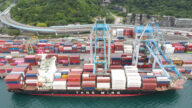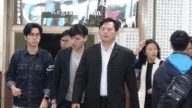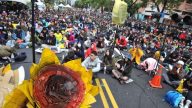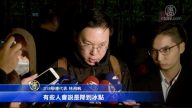【新唐人2014年04月01日訊】日前,台灣50萬名學生與民眾,前往總統府前凱達格蘭大道,表達反服貿訴求。運動結束後,人潮快速散去,整個過程和平理性,台灣各大媒體給予全程報導並高度肯定。而同一天,廣東省茂名市民為抗議當地政府興建PX化工廠,與警方發生激烈衝突,導致多人死亡,數百人受傷的慘劇,然而,消息卻遭到全面封鎖。有分析指出,這正好反映了海峽兩岸政治體制的不同。
3月30號,面對層層拒馬、蛇龍保護的台灣總統府,50萬身穿黑衣、手持太陽花的台灣學生與民眾,前往總統府前的凱達格蘭大道,堅定的喊出:「退回服貿!捍衛民主!」
當晚7點30分,活動總指揮林飛帆發表了17分鐘演說,他表示,總統馬英九29號在記者會上,針對學生提出的四項要求,並沒有做出任何具體承諾,因此,佔領國會的行動將持續下去。演說結束後,林飛帆一聲令下,50萬人隨即有秩序的散場,約半個小時就清空凱道,現場的垃圾也被淨空,整個過程和平理性。
旅美政論家伍凡:「台灣的老百姓在民主制度下,老百姓和政府的互動是平和的,並且要求提的非常明確,政府也一再回答,但是沒有達成協議,現在還在繼續,要進行公民運動,進行抗議,要反服貿。同時在現場,也有支持反反服貿的,但是他也沒有去幹擾反服貿的人,雙方都是平和的把意見講出來。我想這是民主制度下,民主的文化塑造了一批有民主文化素養的老百姓。」
有台灣學者在示威現場表示,服貿協議事前黑箱作業,人們要求公民參與、政府信息公開以及人權保障。
時事評論員藍述:「服貿為甚麼在台灣引起了如此強烈的反彈,就是因為台灣人民擔心將來通過類似於服貿等等兩岸合作,台灣越來越受到大陸的控制。他們擔心將來有一天連反服貿的遊行都不能搞了,搞不好有一天台灣就變成像大陸一樣,你想示威,都不准你示威了,或者你去示威,沒人給你報導了,所有新聞都被封鎖了。」
據了解,針對330反服貿運動,台灣各大媒體給予全程報導,不少媒體稱讚這場「太陽花學運」寫下了歷史新頁,不少國際媒體也給予高度肯定。
然而,海峽對岸的民眾維權就沒有那麼順利了。
3月30號早上8點,廣東省茂名市上萬市民舉行示威遊行,他們手持「PX專案滾出茂名」、「保護市民健康」等標語,抗議當地政府計劃興建PX(二甲苯)化工廠。當天晚上7點,市民再次聚集市政府,廣東當局出動大批武警和官兵鎮壓,並使用催淚彈、高壓水槍等方式強制驅離,雙方爆發激烈衝突。
伍凡:「PX工廠是非常劇毒的化學工業,現在中國起碼10幾家了,都在居民區附近。老百姓為了保護他們自己和後代,他們抗議,遭到武力鎮壓,這事情在中國最近這幾年頻頻發生,屢見不鮮。這就是一個共產制度,專制獨裁製度,為了所謂的經濟利益,實際上是為了維護共產政權的利益,不考慮老百姓的死活,跟台灣的做法完全相反。」
針對這起警民衝突事件,茂名當地媒體沒有報導,互聯網上相關微博帖子也遭到刪除。31號,有網友發佈消息說,已有8人死亡,80多人重傷,200多人輕傷。
藍述:「同樣的文化背景,但是兩種不同的政治制度之下,民眾所擁有的自由是完完全全不一樣的。」
伍凡:「專制獨裁的制度,是沒有言論自由、沒有新聞自由、沒有出版自由,也沒有網路自由,通通封鎖消息。台灣是把消息向全世界公布,只要不危害國家利益的,不是作為保密性質的,都可以公開。可是中國呢,大事、小事,通通是國家秘密,只能由官方的新華社記者寫出通稿,發到全國。」
31號,有網友在微博說,祖國的未來不是化學工程,而是在排放毒氣的化學工程毒害了孩子們,孩子的未來在哪裏?我們老了,不用多久就會離去,可是孩子怎麼生存?
採訪/朱智善 編輯/陳潔 後製/陳建銘
Taiwan’s 330 Anti-Trade Pact vs. Guangdong Demonstration
Recently, 500,000 Taiwanese gathered in front of the
Presidential Palace protesting against the cross strait trade pact.
The entire process went through peacefully and rationally and
the crowd left immediately after the protest, receiving much
praise from the media.
On the same day, a demonstration also took place in Maoming
city of Guangdong Province against a local government decision
to build a PX chemical plant.
Clashes occurred between the protestors and the police
resulting in many deaths and hundreds injured.
The news was completely blocked.
It is analyzed that the two demonstrations reflect the difference
between
the political systems across the Taiwan Strait.
On March 30, Taiwan Presidential Office was protected by
layers of knife rest and gabion.
Around 500,000 Taiwanese wearing black and holding
sunflowers arrived in front of the Presidential Office shouting
firmly, “Reject trade pact, Defend democracy."
At 7:30PM, the event commander Lin Feifan delivered a
17 minute speech stating that President Ma Ying-jeou did not
address students’ request with concrete answers on the 29th at
the press conference,
therefore, the activity to occupy congress will continue.
After finishing his speech, Lin Feifan dismissed the crowd.
In half of an hour, the crowd was gone, the garbage on the
street was cleared, and the entire process was peaceful
and sensible.
Wu Fan, political commentator: “Under democracy,
Taiwanese share mutual and peaceful interactions with the
government.
Their demands are clear, and the government responds.
Even though no agreement was reached, they will continue
the civil movement and the protest against the trade pact.
There were also people opposing the protest.
But they did not interfere with the protestors.
Peacefully, they exchanged their opinions.
I think this shows how democracy can shape and cultivate
people of civilization."
Taiwan scholars participating in the demonstration opposed the
behind closed doors trade pact, and indicated that people
demand citizens’ participation, open governmental information
and protection of human rights.
Lan Su, commentator: “Why did the cross-strait trade pact
cause such a strong rally?
It is because people in Taiwan worried cross-strait
cooperation through the trade pact will lead to further control
of Taiwan by China.
They worried that protests such as this can not even be
guaranteed one day.
Taiwan might become like China, where no protest is allowed,
or the protest is not reported, and all news is blocked."
The March 30 demonstration, known as the sunflower
movement, has received full media coverage.
Many media, including international media, have praised this
sunflower movement for its historical insight.
However, the protestors across the Taiwan Strait were not so
lucky.
At 8AM of March 30, tens of thousands of people in Maoming,
Guangdong Province, protested against the local government
plans to build the PX (xylene) chemical plant.
In the demonstration,they held slogans stating “PX project,
Get out of Maoming," and “Protect the public health."
At 7PM, people gathered again in front of the Municipal
Government.
The Guangdong authorities dispatched a large number of
armed police and soldiers to conduct forced eviction using
tear gas and water cannons.
Violent clashes broke out.
Wu Fan: “The PX plant is a very poisonous chemical industry.
There are at least a dozen of these plants in China, situated in
residential areas.
For their own and the next generation’s future, they protest
but only meet armed suppression.
It has been so frequent in China these years.
This is the Communist system, the autocratic regime.
The so-called economic interests care for none of the people’s
interests but that of the regime.
It is exactly the opposite approach of Taiwan."
Local media had no report of this clash.
Posts on the Internet were deleted.
On the 31st, netizens revealed through the Web saying that
at least 8 died, 80 seriously injured, and 200 minor injured.
Lan Su: “With the same cultural background, but people share
completely different freedom under two different political
systems."
Wu Fan: “There is no freedom of speech, media, press, or
Internet under the dictatorial regime. Everything is blocked.
But, Taiwan keeps everything public to the world, as long as
it does not violate the national interest and confidentiality.
While in China, be it small or big, everything is a national secret.
Only official notice from Xinhua News Agency can be reported."
A netizen stated on the Weibo on the 31st:
The chemical industry is not our future, but these toxic
chemicals are killing our children.
What is our children’s future?
We will soon be gone as we are old, but what about our children?
Interview/Zhu Zhishan Edit/Chen Jie Post-Production/Chen Jianming


























